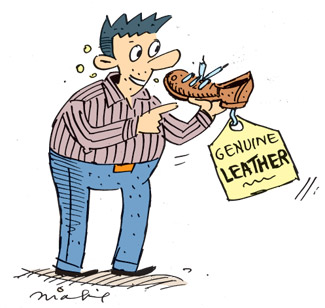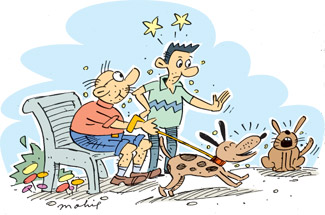|

Many uses of 'used'
-

Leather is used to make shoes.
|
'Used' is the past tense of the verb 'use'. It can also be used as an
adjective and a modal verb.
1. We use 'used' to talk about things that happened regularly in the
past.
When I was a child I used to walk to school.
Khema doesn't dance now, but she used to.
Peter used to park his car under the tamarind tree.
Susila used to play the violin in the morning.
We used to swim in the river.
2. We use 'used' to talk about how things were in the past.
Hema used to be much quieter in the class.
A measure of rice used to cost 25 cents!
Bob used to love pop music when he was young.
Jaliya used to smoke when he was abroad.
People used to come to Hudson Park when it was maintained properly.
3. We use 'used' to talk about things we are familiar with.
I didn't like the job at first but I got used to it after some time.
I am not used to dogs, they scare me!
Nimal is used to driving now as he is living in the US.
|

I am not used to dogs, they scare me!
|
She has got used to living alone.
We use 'used' to describe how and why things are used.
Solar power can be used to provide electricity.
Leather is used to make shoes.
Wood can be used to make furniture.
5. set phrases
Vehicles are more expensive than they used to be.
People are slowly getting used to increased prices of vegetables.

Here is a novel way to increase your word power. Read the sentences
carefully and match the words in bold type with their meanings. Check
your answers with the key.
1. The doctor advised the patient not to use an inexpensive
substitute for butter.
(a) imitation
(b) relief
(c) copy
2. Cargo containers reach the harbour almost everyday.
(a) jars
(b) vessels
(c) envelopes
3. Steam was used to drive ships in the distant past.
(a) push
(b) steer
(c) move
4. Vegetables can be grown in almost any fertile soil.
(a) rich
(b) dry
(c) wet
5. The price of oil will soar once again.
(a) fall
(b) rise
(c) turn
6. Noise pollution is considered in terms of the intensity of the
noise levels.
(a) type
(b) brightness
(c) magnitude
7. T-shirts are popular with both men and women.
(a) fashionable
(b) respected
(c) accepted
8. The Earth is a planet with a magnetic field
(a) course
(b) area
(c) meadow
9. The voice of the puma is similar to that of a domestic cat.
(a) quiet
(b) wild
(c) tame
10. Quills were the principal writing instruments in the past.
(a) implements
(b) produces
(c) means
*******
key
1(a), 2(b), 3(c), 4(a), 5(b), 6(c), 7(a), 8(b), 9(c), 10(a)
Current English usage
English is a living language and it changes from time to time. Some
words go out of use and new words are borrowed from other languages.
Therefore, it is always helpful for you to be familiar with modern
English usage.
1. Centre and Middle
Centre gives a more precise meaning than middle.
You can draw a line through the centre of the circle.
She sat in a seat in the middle of the front row.
2. Chairman, chairwoman, chairperson
Chairman is found in common usage. Some times chairwoman was used
but it did not become popular.
When a woman heads an organisation or committee Chairperson is commonly
used to avoid sexism.
3. Challenged
This is a modern suffix which is part of politically correct
language. It is used to convey a disadvantage, problem or disorder.
So we speak of visually challenged (blind), or aurally challenged (deaf)
people.
Challenged can be used humorously as in "Sam is now a financially
challenged businessman," meaning ' penniless".
4. Chaperon and chaperone
mean 'an older woman who accompanies a young unmarried woman on social
occasions. Both are acceptable spellings.
Starters
Subject-verb agreement in positive
questions
Statements simply give information but questions seek information.
When we ask for information, we use the question form. Statements can be
turned into questions by changing the order of words.
Statement: That is your son.
Question: Is that your son?
Statement: Children are
swimming.
Question: Are children
swimming?
Singular subjects take the verb is, except for the singular pronouns I
and you which take am and are respectively.
Statement: I am a girl.
Question: Am I a girl?
Statement: You are a teacher.
Question:
Are you a teacher?
In order to form questions with most verbs, change the verbs to their
base form and add the verb to do before the subject.
Statement: Nalan sings pop
songs.
Question: Does Nalan sing pop
songs?
Statement: Prabha enjoys
singing.
Question: Does Prabha enjoy
singing?
Statement: People follow the
leader.
Question: Do people follow
the leader?
Statement: I like to write.
Question: Do I like to write?
Statement: You dance well.
Question: Do you dance well?
Activity
Change the following statements into questions.
1. Martha likes dairy products.
2. This is my first visit to Sigiriya.
3. There are many five star hotels in Colombo.
4. Malini and Renuka sing well.
5. Amitha holds a Master's degree.
6. Buddhists observe five precepts.
7. You know the area very well.
8. Jason is a well-mannered boy.
9. Father treats us well.
10. You are sure that he is not coming.
Key
1. Does Martha like dairy products?
2. Is this my first visit to Sigiriya?
3. Are there many five star hotels in Colombo?
4. Do Malini and Renuka sing well?
5. Does Amitha hold a Master's degree?
6. Do Buddhists observe five precepts?
7. Do you know the area very well?
8. Is Jason a well-mannered boy?
9. Does father treat us well?
10. Are you sure that he is not coming? |

